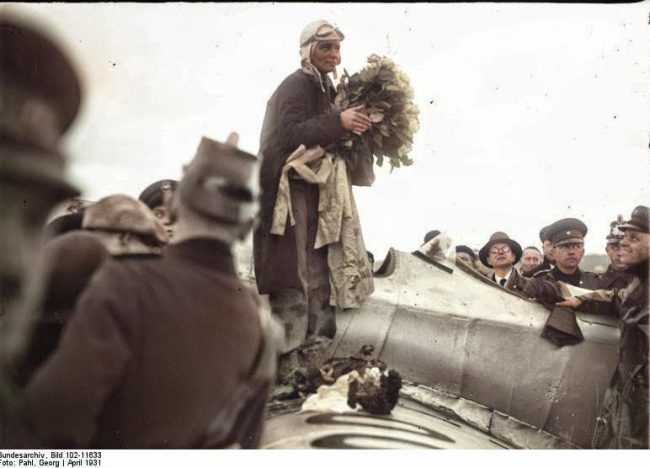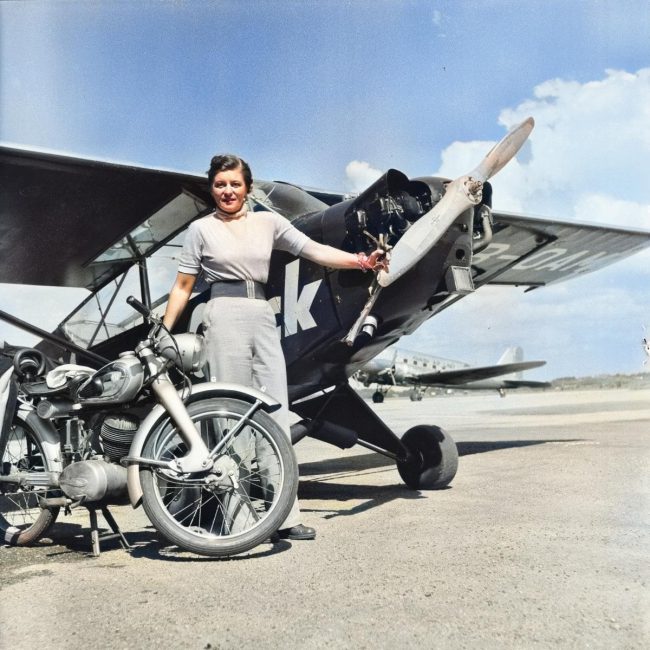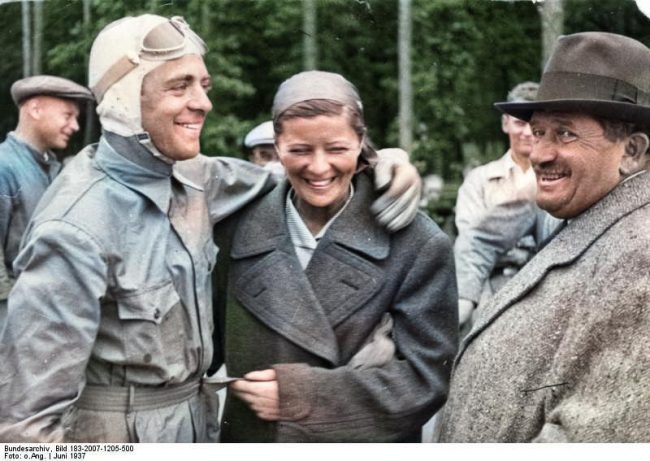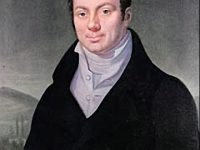
Elly Beinhorn arrives at Berlin Tempelhof in 1931 Image Source: German Federal Archive, Accession number:102-11633
On May 30, 1907, German aviatrix and stunt pilot Elly Beinhorn was born. In the 1930s she broke several long distance flight records including flying over three continents in a single day. When it comes to the history of aviation, there seem to be less gender issues compared to other technological disciplines, as our growing list of women aviation pioneers here at SciHi blog can proof (cf. below). We already reported on Amy Johnson and her flight to Australia as well as about famous Amelia Earhart,[7] who got lost during one of her record breaking flights over the Pacific. Today, we want to draw the focus to a German aviatrix, Elly Beinhorn. There is actually also a personal connection with today’s story, because my grandmother made a piloting license for gliders back in the 1930s. From her tellings when I was a child, I know that she pretty much admired Elly Beinhorn as an example for her own ambitions.
The Spark that lead to a Lifelong Interest in Aviation
An only child, Elly Beinhorn was born into a merchant family in Hannover, Germany, where she grew up dreaming of travel and adventure in foreign lands. At the age of 20, she attended a lecture by famed aviator Hermann Köhl, who had recently completed a historic East-West Atlantic crossing, which must have been the initial spark that ignited her lifelong interest in aviation. On the next day, Elly was reporting to the president of the aviation club in Hannover to take flying lessons. But, he tried to persuade her that as being a woman she would have no chance to get a job as an aviator. Nevertheless, Elly was sticking to her idea. Her mother was crying and her father doubted about her reasoning. Against all odds, with funds from a small inheritance she moved to Spandau in Berlin where she took flying lessons, at Berlin-Staaken airport, under the tutelage of instructor Otto Thomsen. She soon made her solo flight in a small Klemm KL-20. With her money running out, it was suggested that she give aerobatic displays on the weekends. She found this financially rewarding, but personally unsatisfying.
A Passion for Long Distance Flight
Long distance flying should become her real passion and in 1931 she seized the opportunity to fly to Portuguese Guinea, West Africa on a scientific expedition. On the return journey, engine failure resulted in a crash-landing in the Sahara. With the help of nomadic Tuareg tribesmen, Elly joined a camel caravan to Timbuktu. She subsequently returned to the crash site to recover parts of the plane. Word of her plight reached the French authorities and they sent a military two-seater plane to collect her. In April 1931, fully recovered, she was able to fly herself back to Berlin to a warm reception from the crowds.
Meeting The Flying Carpet
Soon after this, she embarked on another flight, her Klemm monoplane developing mechanical problems near Bushire, Persia. She found Moye Stephens, another pilot, in Bushire, who helped her fix the problem on her Klemm. Stephens and travel-adventure writer Richard Halliburton were flying around the world in a Stearman C-3B biplane, they called the Flying Carpet. She accompanied them on part of their flight, including the trip to Mount Everest. She flew on to Bali – and eventually Australia. In the process, she became only the second woman to fly solo from Europe to Australia, after Amy Johnson.

Woman in Helsinki 1952 Summer Olympics. Plane in the background is Elly Beinhorn’s Piper J-3C-65 Cub with designation HB-OAM and description of the photo says that it is most likely herself.
Australia, New Zealand, and South America
Having landed in Darwin, North Australia, Elly headed down to Sydney, arriving in March 1932. Her plane was dismantled and shipped to New Zealand, then Panama where it was reassembled. There Elly resumed her flight, following the western coast of South America, where she was presented with a medal in Peru. An ill-advised trip across the Andes followed. The plane was dismantled once more in Brazil and shipped to Germany. Elly arrived in Berlin in June 1932.
Famous but in Debt
Now famous but in debt to the tune of 15,000 marks or more, she was pleasantly surprised to be awarded the Hindenburg Cup, 10,000 marks and several other monetary awards from the German aeronautical industry which enabled her to continue her career. She also continued to write articles and sell photographs of her travels to raise funds. Free of debt, she took off for Africa using a Heinkel He 71, flying down the east coast, then back up the west coast. The following year, Elly shipped the plane to Panama, then flew through Mexico and California before crossing the United States to Washington DC and Miami. Elly and the plane returned to Germany by ship, arriving in January 1935. She was now a true German heroine.

Elly Beinhorn (center) with Bernd Rosemeyer and Ferdinand Porsche
The Aviatrix and the Racing Driver
On 29 September 1935 Elly attended the Grand Prix, held in the town of Brno in Czechoslovakia. She congratulated the winner, Bernd Rosemeyer, who seemed smitten with her. They danced together that night and were married on 13 July 1936. A true celebrity couple – an adventurous aviator and the fearless racing driver – they were the toast of Nazi Germany. Heinrich Himmler ordered a reluctant Bernd to become a member of the SS. Just ten weeks after the birth of their son in 1937, Rosemeyer was killed while attempting a speed record. As a national hero he was mourned by much of Germany. After World War II she briefly took up gliding due to the ban on powered flight in Germany. But she soon moved to Switzerland to continue flying planes. In 1979, at the age of 72, she surrendered her pilot’s licence. Elly Beinhorn died on 28 November 2007, at the age of 100.
Elly Beinhorn im Interview (Ausschnitt) Fliegerin Elly Beinhorn, 1993, Alleinflug, [11]
References and Further Reading:
- [1] Elly Beinhorn at John Oxley Library
- [2] Elly Beinhorn at Zeit Online [in German]
- [3] Elly Beinhorn at the German National Library
- [4] Aviatrix Amy Johnson and the Flight to Australia, SciHi Blog
- [5] Aviation Pioneer Harriet Quimby, SciHi Blog
- [6] Aviatrix Wilhelmine Reichard, SciHi Blog
- [7] Amelia Earhart – Record-breaking Aviation Pioneer, SciHi Blog
- [8] German pilot Elly Beinhorn dies, aged 100 at WikiNews
- [9] Newspaper clippings about Elly Beinhorn in the 20th Century Press Archives of the German National Library of Economics (ZBW)
- [10] Elly Beinhorn at Wikidata
- [11] Elly Beinhorn im Interview (Ausschnitt) Fliegerin Elly Beinhorn, 1993, Alleinflug, anyfilm1 @ youtube
- [12] Katja Iken: Flug-Pionierin Elly Beinhorn – Das fliegende Frauenzimmer. In: Spiegel Online, 3. Dezember 2007
- [13] Malte Jürgens: Elly Beinhorn gestorben. In: Motor Klassik, 30. November 2007
- [14] Timeline of female aviation pioneers born before 1905, via Wikidata





